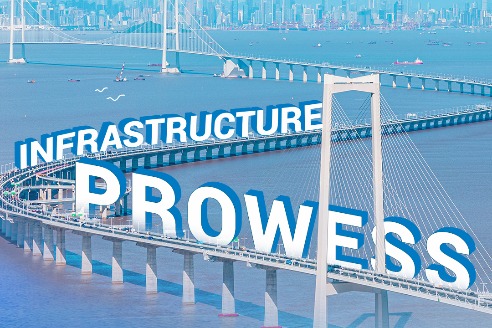MNCs eyeing Belt, Road benefits

More international firms looking to team up with Chinese counterparts
Despite doubts among some detractors, two CEOs of Western multinational corporations said they see substantial growth opportunities in China's Belt and Road Initiative, and are actively angling for a piece of the trade initiative in an attempt to win more orders.
MNCs, including leading global mining group Rio Tinto and manufacturing and technology conglomerate Honeywell, have said they are willing to team up with Chinese companies to further expand in Belt and Road markets, contributing their technologies and global footprint in infrastructure-related sectors, including power, oil and gas, chemicals, minerals and building materials.
"Chinese authorities are pragmatic about infrastructure and have placed the Belt and Road Initiative at the center of the policy agenda," said Rio Tinto CEO Jean-Sebastien Jacques.
"Infrastructure is fundamental to global growth - it underpins communities and builds nations. China has shown the world what can be achieved," he said.
According to Jacques, China's infrastructure boom provides lessons for the rest of the world. Infrastructure including roads, railways, transport links and power generation are key to supporting global growth and can unleash economic growth by creating jobs, increasing investment and enhancing productivity.
"The world is already looking at how China, the wider Asian region and the rest of the world can cooperate and make better use of bilateral and multilateral approaches to deliver all-important regional infrastructure," he said.
"At Rio Tinto, our business sees the potential from a greater focus on infrastructure through the Belt and Road Initiative. We are pioneers in mining and metals, and produce materials essential to human progress that are also needed for the rollout of the Belt and Road Initiative through infrastructure."
China's development is closely connected with that of all other countries and its commitment to peaceful development will not change, Premier Li Keqiang said when delivering the Government Work Report at the first session of the 13th National People's Congress on March 5.
The Belt and Road Initiative, for instance, offers opportunities for cooperation and development for all countries amid a sluggish global economy.
Shane Tedjarati, president of Honeywell Global High Growth Regions, said Honeywell is well-positioned to support the Belt and Road Initiative through its China growth strategy and portfolio.
To support the initiative, the company provides a range of engineering and aerospace systems as well as consumer and commercial products, and has been partnering with leading Chinese companies for years to explore infrastructure development and other opportunities in emerging markets, he said.
Global mining giant BHP believes projects involved with the Belt and Road Initiative are expected to drive up to 150 million metric tons of steel demand and positively affect the global business layout.
Spread over a decade, this amounts to an additional 15 million tons per year, or 3 to 4 percent incremental demand growth for steel in regions participating in the Belt and Road Initiative, said Arnoud Balhuizen, chief commercial officer of BHP.
"The demand for infrastructure investment in countries and regions participating in the initiative is huge, and such investment will drive significant demand for construction materials and equipment, leading to an increase in direct and indirect demand for steel," he said.
Analysts believe Chinese companies have made huge technological progress in the past few years. Yet many Western multinationals still lead in various ways, like Honeywell's pipeline automation technology, and the teaming up will be a win-win for both sides.
The initiative could well be a windfall for MNCs and will benefit Chinese companies as well, said Zhang Jianping, director of international economic cooperation at the National Development and Reform Commission.
No one with an Asian strategy will ignore the Belt and Road Initiative. It is a historical precedent and enables companies from home and abroad to jointly explore overseas markets, as the projects and market potential are just too big to ignore, he said.
Figures from the Mercator Institute for China Studies reveal that economies involved with the initiative account for about 30 percent of the global economy, while figures from China Development Bank show that some $900 billion worth of projects is now either underway or in detailed planning stages.
- In pics: autumn harvest across China
- A glimpse into China's 75 years of innovation through IP endeavors
- Chinese revel in culture, tourism feast during holiday
- World leaders extend congratulations on PRC's 75th founding anniversary
- Ethnic vloggers popularize highs and lows of rural life
- 2 killed as typhoon lands in Taiwan





































